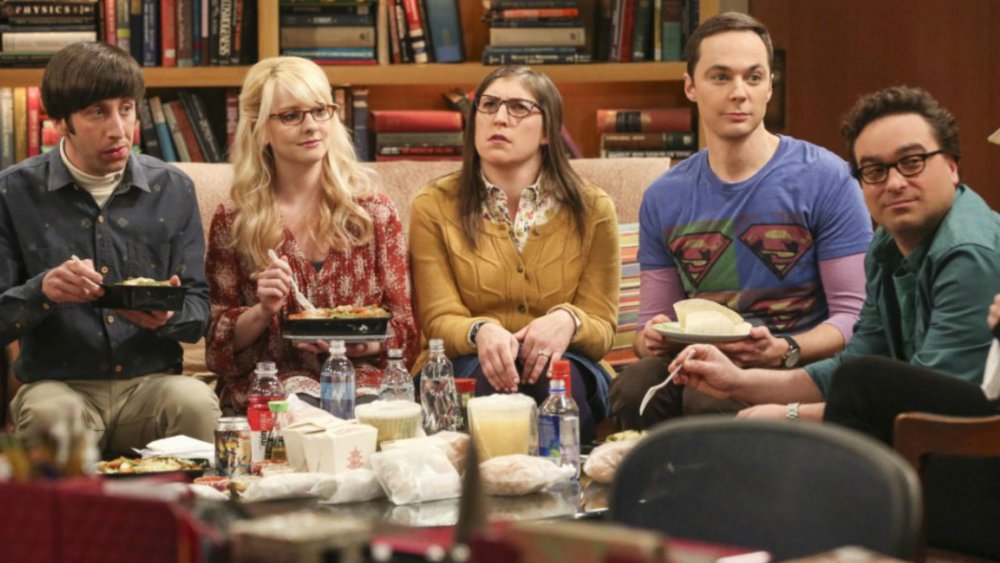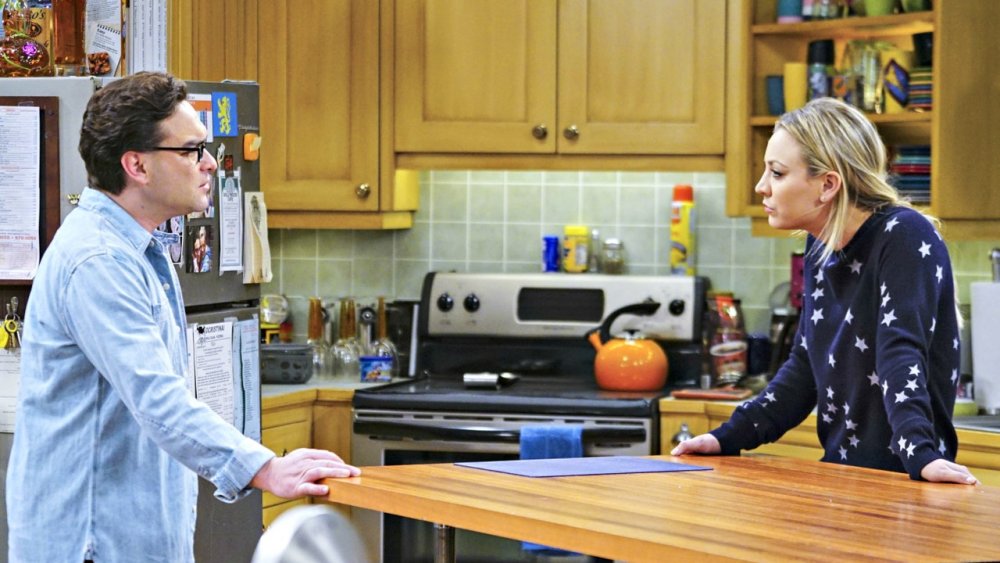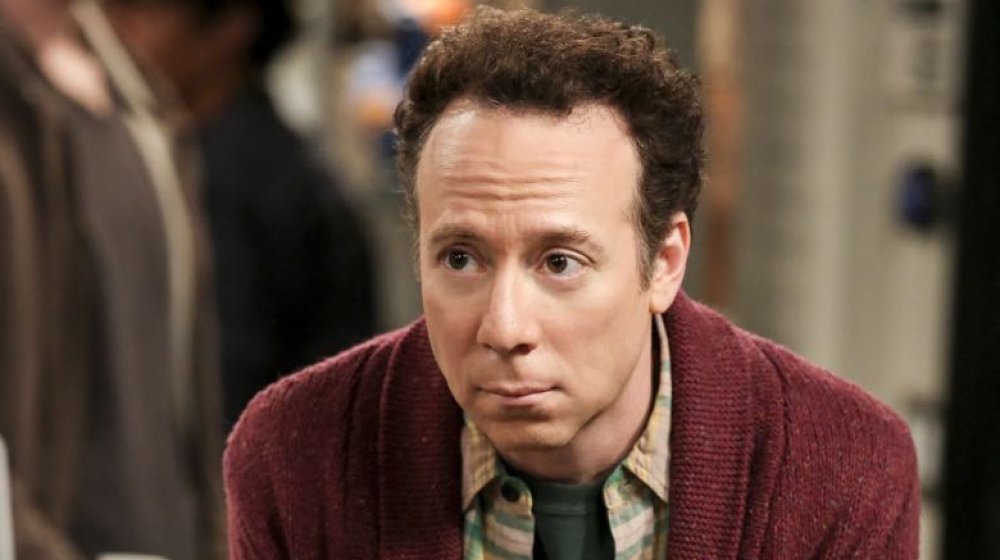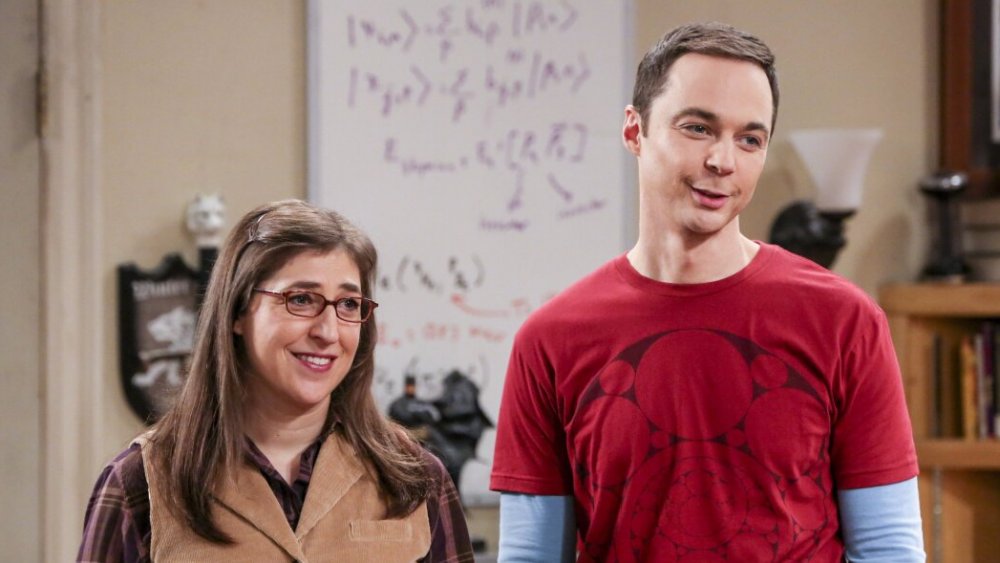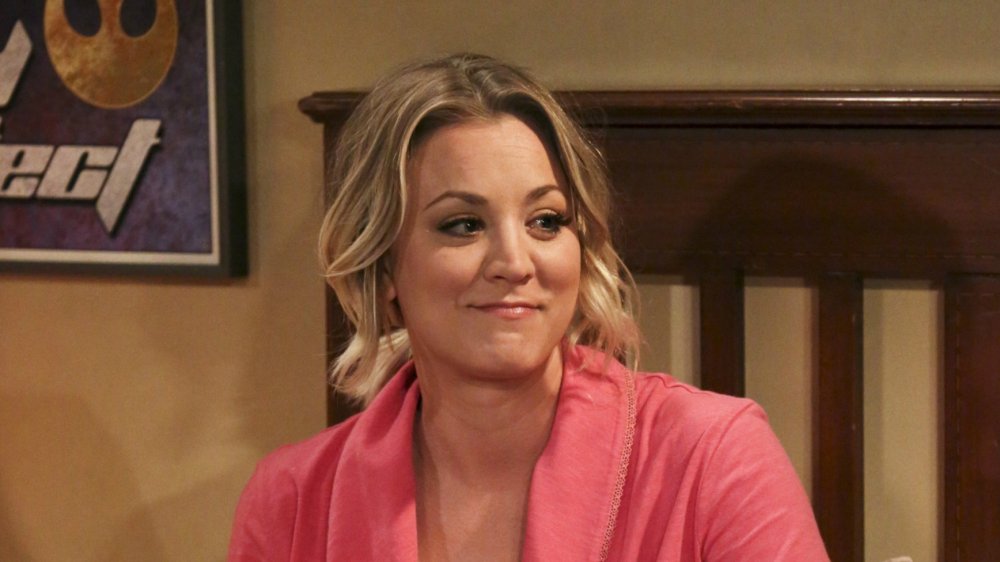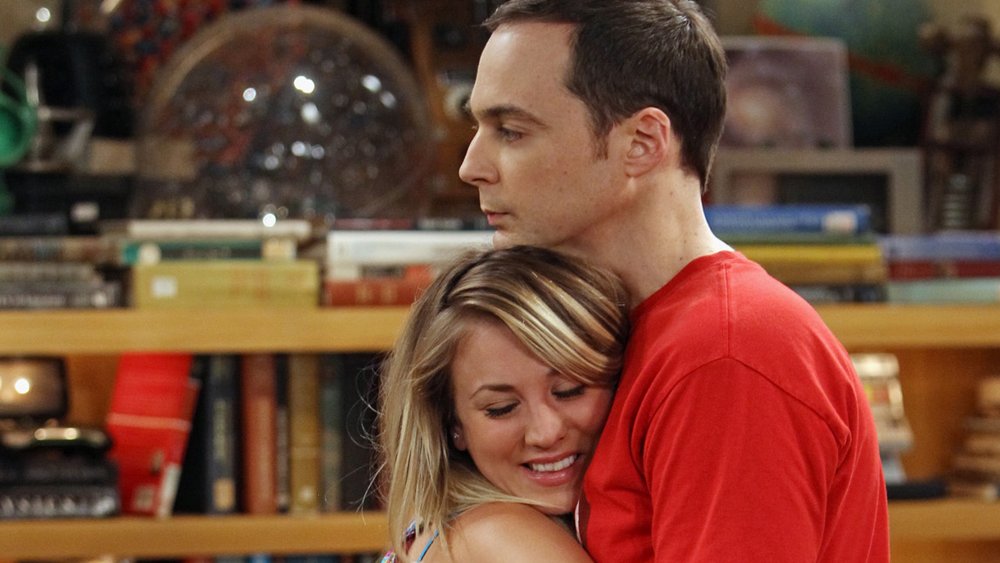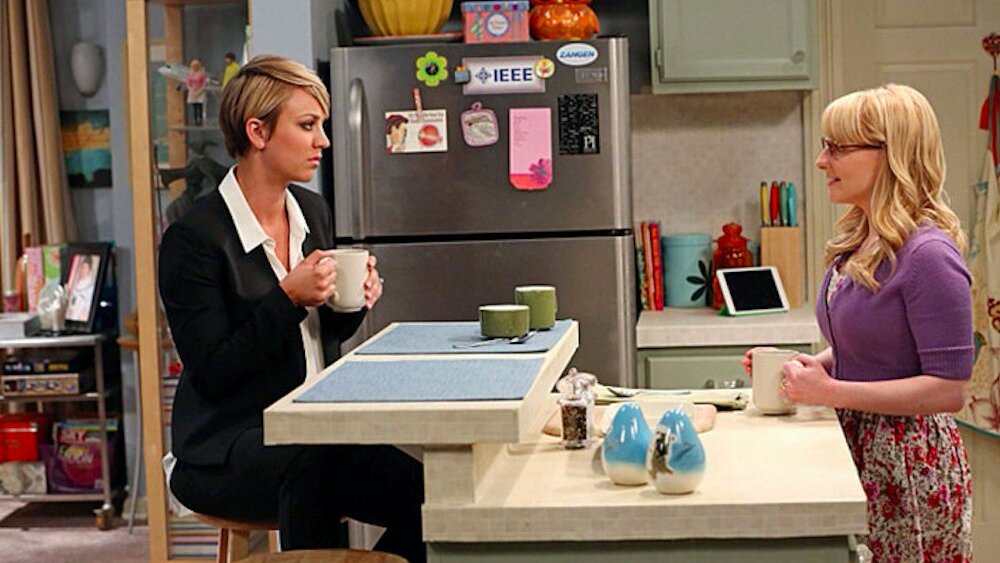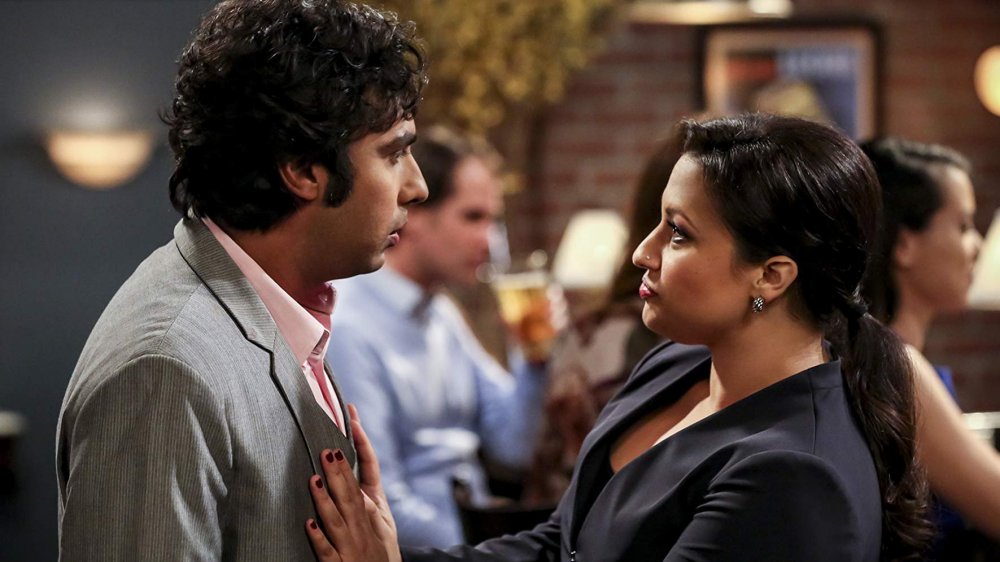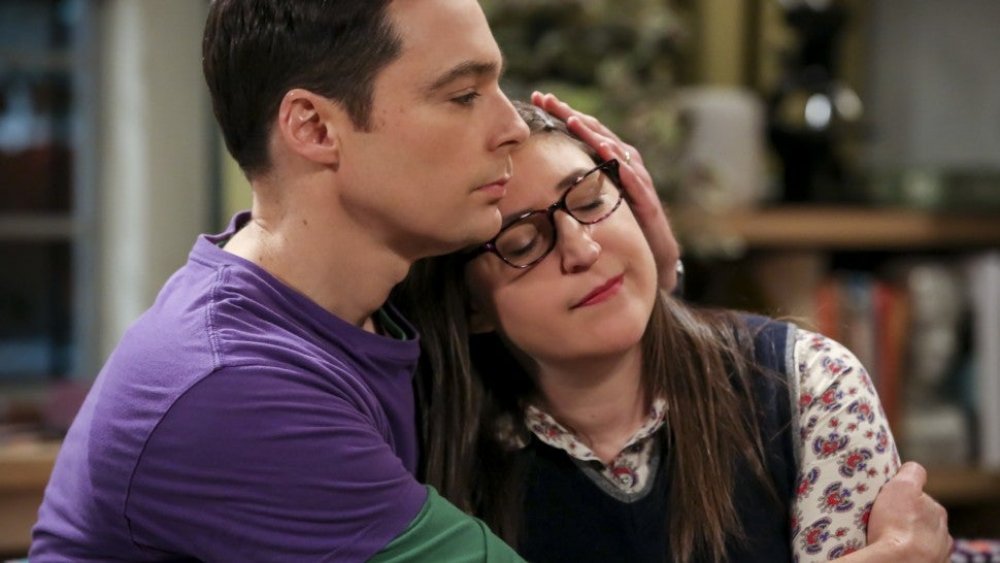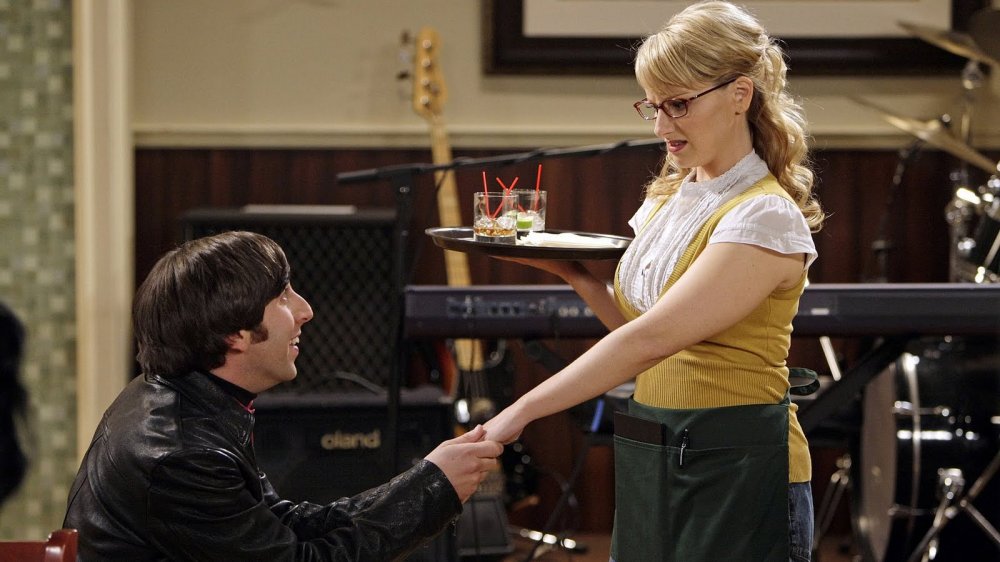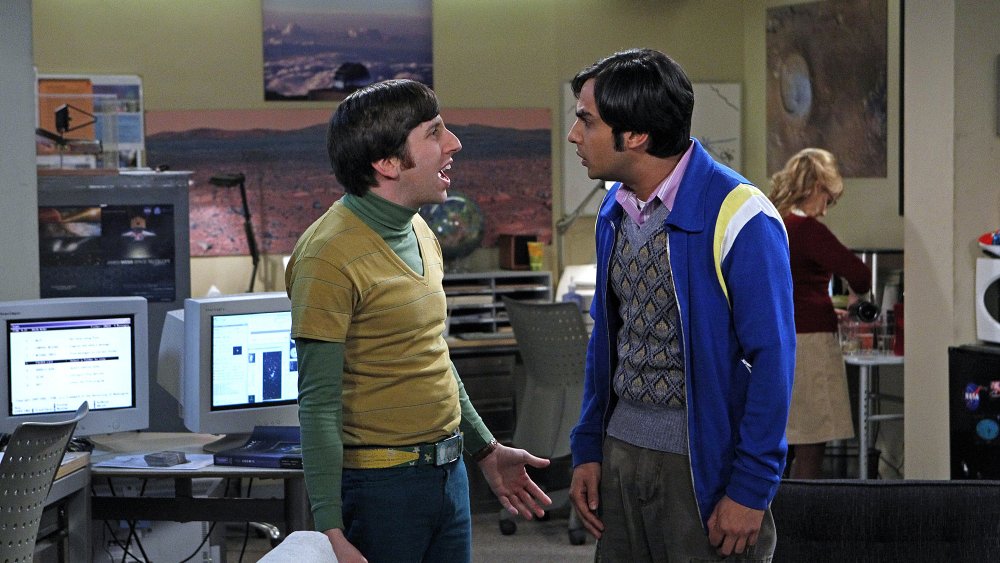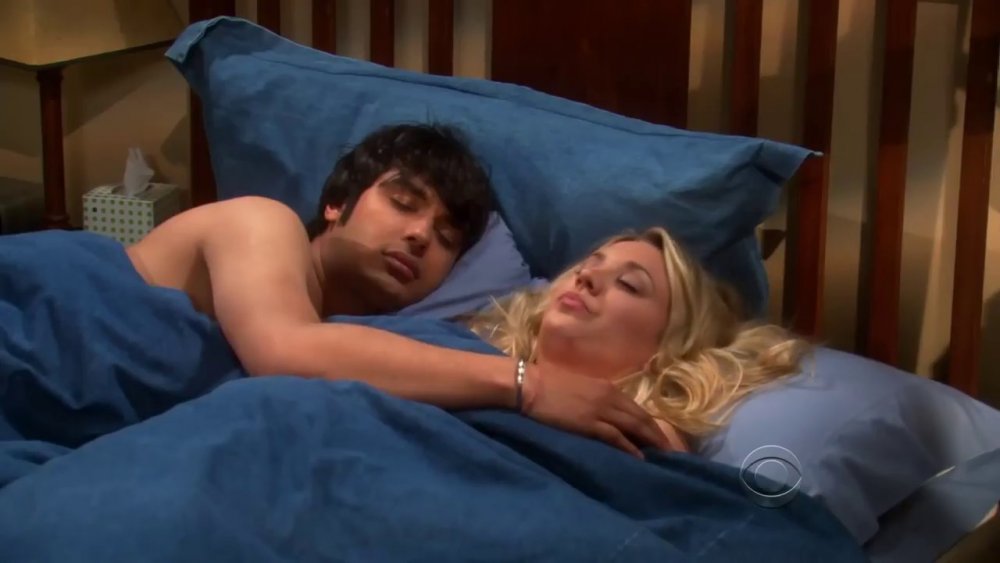Big Bang Theory Storylines That Fans Hated
Few shows represent a greater study in the science of polarization than The Big Bang Theory. Of course, the polarization specific to this sitcom isn't of the electric variety. The series, despite its relative popularity, was extremely divisive among audiences, creating haters as vehement as its fans. The detractors insist that The Big Bang Theory passes off weak nerd-culture humor as comedic genius, accessible only to "fellow geniuses," when in reality, it's not rocket science to understand the references and decode the jargon at the foundation of these one-liners and running gags... And it takes even less brainpower to realize that none of it is all that funny.
Harsh, right? For all the criticism, though, the fans are devoted in their defense of these endearing characters and the show's glimpse into nerd culture, even if it's a bit of a caricature. However, there is definitely a lot of division within the fanbase itself. Each of the following storylines created quite the combustion reaction. Here's a look at Big Bang Theory storylines that fans hated.
Leonard's not-at-all-Leonard storylines
Leonard cheating on Penny was completely out of character, given how innocent and devoted he has been shown to be in his affection toward her. As much as the show played into geeky tropes, like the nerd falling head over heels for the popular girl, there was something wholesome about Leonard's interest in Penny, and fans couldn't help but root for them. This is part of the reason it felt so cheap to keep stalling the relationship just to keep fans on the hook. Whether this manipulation was real or imagined, fans resented the various sidesteps.
One of fans' least favorite diversions was Leonard's relationship with Stephanie. Although there was some opportunity here to explore Leonard's chemistry with an outside character, it seemed rushed, both as it began and as it ended. The two have sex almost immediately after meeting each other. Then, after Leonard asks her to move out via text, she's never heard from again.
Distractions aside, Leonard and Penny had the potential to be, and at many times were, a really sweet couple with a great love story. But they were dealt a tough hand by the writers, who, in the pursuit of introducing obstacles and "keeping things interesting," often ended up missing the point.
Misery, without company
Stuart's misery is simply used as a gag without real character development, and as much as he wants to gain the acceptance of the gang, the writers seemed to decide that he was much funnier in depression and relative isolation. Even characters like Garry/Jerry/Larry/Terry Gergich/Gengurch on Parks and Rec, who are famous for their misfortune, actually get a lot of development as we peek into their lives and watch them blossom to the extent that they can.
Not so with Stuart. The poor guy became hard to watch after a while as he never really changed in any substantive way. Audiences loved him for the well-meaning, goofy outcast he was. But it never seemed like the writers or the core characters agreed. Instead, Stuart was milked for all the awkward sympathy he was worth, but really only enjoyed cursory storylines.
Case in point: The actor Kevin Sussman, who played Stuart, was upgraded to a main cast member during the seasons Howard was away in space and Raj desperately needed someone to hang out with. When Howard returned, Sussman was downgraded to a recurring character once again. Whether comedic or tragic, the character simply existed to fill out a lineup.
Relationships vs. friendships
In successful sitcoms, relationships are often used to spur character growth. In this show, though, the relationships mainly take over the lives of the individuals, and the original dynamic of the four friends is lost. This oscillation between the extremes of different types of relationships reinforces the stereotype that nerds have trouble juggling their social lives. Of course they're not sophisticated enough to balance a romantic relationship and a group dynamic, right?
Not that exploring personal lives is a bad thing. On the contrary, personal storylines that deviate from the ensemble are often employed in sitcoms to enrich the appeal of beloved characters as well as to set up more in-depth investigations of all of the relationships involved. But it's important to retain the heart of the show and instead, the character's relationships distance them from their social core.
In a way, having these characters enter into romantic relationships is a way of subverting the stereotypical celibate nerd identity. But really, isn't the goal to show that nerds can find love, confront their social issues, and remain endearing without forsaking their roots in the social circle the show was built upon in the first place?
A pretty penny
The characters and writers really seem to hate on the token "normie" in the group, Penny. She's flighty and lacks substance, without much real aspiration personally or professionally. Setting her up as a foil to the nerds next door only plays into the shallow portrayal of nerd vs. normie, allowing the rest of the cast to make jokes at her expense simply because she doesn't share their background. Would these jokes even be funny if Penny's "ignorance" weren't there to be taken advantage of?
The show is widely rebuked for feeding the superiority complex of people who want to feel or appear smart by dangling scientific jargon over the heads of others under the guise of comedy. Belittling Penny through the way she is written is a less-than-appealing instance of this tired formula. Penny is supposed to be the "normal one," but many interpret her portrayal as, essentially, saying that normal people aren't as good as antisocial scientists.
Sheldon's birthday plot hole
Fans caught the fact that Penny refers to Sheldon as a Pisces, his actual sun sign, in season 8, even though she had referred to him as a Taurus earlier in the series. These signs aren't even adjacent. On its own, this probably wouldn't be that big of a deal, but what's frustrating is that signs are used, at least by Penny, to justify character traits in Sheldon. (Astrology is yet another stereotypical blonde obsession.) But it doesn't really matter, because many of the "character traits" in the show aren't based in a deeper understanding of the character, but used for jokes about nerd culture instead.
And speaking of character traits, if Penny got his birthday wrong, wouldn't you think Sheldon would correct her? That's much more in line with his personality. Especially since, by season 8, he's started to master sarcasm.
Still, one of Sheldon's birthdays is actually a watershed moment in his friendship with Penny. In "The Celebration Experimentation," Sheldon gets the opportunity to make up for his complicated past relationship with his birthday when he allows his girlfriend and friends to throw him a birthday bash. He ends up having a panic attack, during which Penny stays by his side in the bathroom, because he's one of her favorite people. When she hugs him, he admits that he used to hate these hugs, but now they're just extremely irritating.
Female bullies
We learn that Penny was a bully in high school, and retains some of those tendencies now. Bernadette also tends to bully those around her, which is mildly funny at first, but quickly loses this effect. For example, hearing her comment on her boss's "wuss" grandson and explain her word choice by explaining that you can't say "sissy" anymore is not a moment that has aged gracefully. (A number of her jabs center around masculinity: She causes a rift between Penny and Leonard in "The Scavenger Vortex" when she tells Leonard that Penny doesn't think he's masculine enough.)
The series also depicts women frequently using the guys, simply because they're geeks. Penny is certainly not the worst offender in this regard. Her relationships with each of them genuinely develop into real bonds over the course of the series. Uglier examples include the pretty neighbor who moves in upstairs and begins to take advantage of her nerdy neighbors... And then Penny gets jealous that she no longer gets as much attention from the guys, suggesting that she uses them subconsciously to an extent as well, though admittedly less than the new girl.
Even though she isn't as big of a bully as she was in school, Penny still preys, even unintentionally, on those who are more emotionally or socially vulnerable, especially when she can get something out of it.
The Monopolar Expedition episode
While the group obviously has its ups, downs, and petty squabbles over fixations only nerds would dwell on, the "Monopolar Expedition" episode really makes the guys seem like horrible friends who didn't even like each other. This is a bit confusing, considering that the entire show is based around their friendship.
Of course, their bickering is natural in a friend group and also funny much of the time, a dynamic that forms the backbone of many similar sitcoms. But this storyline goes beyond that, poking holes in the very bonds that hold them together and the affinities they all have for each other.
The episode starts off with everyone getting excited at the prospect of, essentially, getting rid of Sheldon for three months after his grant to go the magnetic North Pole is approved. When he suggests that the three of them come along, they are extremely resistant to spending three months with "an anal nut bag." Howard even goes as far as to say that this kind of scenario could be the one that flips the switch and turns him into the guy who goes crazy and kills Sheldon.
Raj's luck in love (or lack thereof)
Raj is probably the most dateable guy on the show, one who actually wants a family and is loyal and kind. Often, being too sweet and emotional too fast is what damages his relationships: When he suffers selective muteness, Penny introduces him to Emily, who seems like a perfect match because she's deaf — but she seems to help him open up a little too much, as he basically tells her he loves her immediately, only to find out later that she's using him for his family's money.
Even when the series teases a romantic interest for Raj, it rarely lasts. As yet another example, what happened to Yvette the vet? She sort of disappeared, so what was the point in introducing her in the first place? Raj is perhaps the greatest victim of the show's sacrifice of personal development and happiness for the sake of weak plots and gags, from lesbians who just use him for a cover to negative portrayals of social anxiety disorder.
One of Raj's main "relationships," more successful than most in the pitiful context of his love life, is the one with Anu, although this partnering ends up feeling forced (which play negatively into stereotypes of arranged marriage) and dragged out. Even the couple themselves acknowledges that there's no romance, tries to create some, fails, and gives up. The writers seemed to have given up on Raj's love life long before.
A woman scorned
Throughout the series, we watch Amy being spurned time and again in terms of intimacy with Sheldon. These awkward encounters were used for comedy, as a running gag, but in real life, it would be incredibly hurtful for a woman to be constantly denied affection and intimacy, especially as prolonged as the situation was. Whether Sheldon means to or not, he's actually subjecting Amy to a lot of emotional turmoil, and worst of all, her plight pretty much exists for us to laugh at.
Amy's insane jealousy also contributes to a less graceful portrayal than she deserves. The lack of intimacy almost certainly feeds into some degree of insecurity in the relationship. TV tropes often inflate gender stereotypes for comedic effect, which results in characters, especially female, being taken advantage of for the sake of a joke (like when Raj wants Penny to be his arm candy for the People Magazine party). Seeing a nerdy girl questing so desperately for love is quite easy for audiences to make fun of, which only adds insult to injury.
Bernadette becoming like Howard's mother
This entire arc develops, essentially, for the sake of a joke, since Howard has a famously weird relationship with his mom. But it doesn't honor Bernadette's character whatsoever and is also kind of unsavory to watch. One of the first things the two bond over is the fact that they both have overbearing mothers. Instead of growing together from their pasts, both of them return to the toxic roles they understand.
Plus, it's a little creepy to hear Howard say Bernadette is sexy when she's angry, while we as the audience are uncomfortably aware of how similar Bernadette is to Howard's mother when she's enraged. The show chooses to dive right into the tropes of social outcast, weird fetishes, and poor social skills that are stereotypical hallmarks of "nerds" and "geeks," but rather than add dimensions to the characters to show that these stereotypes are unfair generalizations, the series opts to use them for cheap laughs, similar to the way it uses Penny as a perfunctory nod toward the "normies."
Howard's mother issues aren't the only example of this. Other stereotypes range from picky food intolerances to nerds being virgins who play Dungeons and Dragons. It would be easier to name a stereotype they don't use.
Speaking of poorly aged stereotypes...
While we're on the subject, let's talk about the fragility of masculinity, which is often a central element of "nerd culture" portrayals anyway. There are many jabs at Raj and Howard being in love with each other, another cheap "comedic" effort that takes advantage of marginalized LGBTQ+ culture for humor. What makes it worse is how they react so immaturely and disgustedly to the idea.
And from gender and sexuality stigma, we move onto racial insensitivity. Raj's character arc is littered with assumptions and formulaic portrayals of Indian culture. Some are harmless, if still insensitive: Offhand jokes include references to the karmic reward of enduring suffering (the suffering in question is actually the three-month trip from "The Monopolar Expedition") and being reincarnated as "a well-hung billionaire with wings." Other instances delve a little deeper into the way we think about other cultures. The storylines involving his family life and arranged marriage are a source of tension not tempered with much in terms of educational value.
Raj waking up in bed with Penny
Even entertaining the pairing of Raj and Penny is enough to make a lot of fans cringe. There are some lines in every show that you just don't cross, characters between whom there is no sexual tension, and for whose involvement there is no chance at exploring a worthwhile plot. Seeing Raj wake up in bed with Penny crossed that line.
It was later revealed that they hadn't done the deed, and that once again, this moment was used for its shock factor or "entertainment value," if you can call it that, but fans weren't impressed at all. The brief storyline was reminiscent of the many times sitcoms throw random characters together to fill air time or use as placeholders for real creative ideas. And the "twist" meant that the writers didn't even have to commit to their decision, which almost made it worse. They led fans on with a polarizing choice that then turned out to be a red herring.
